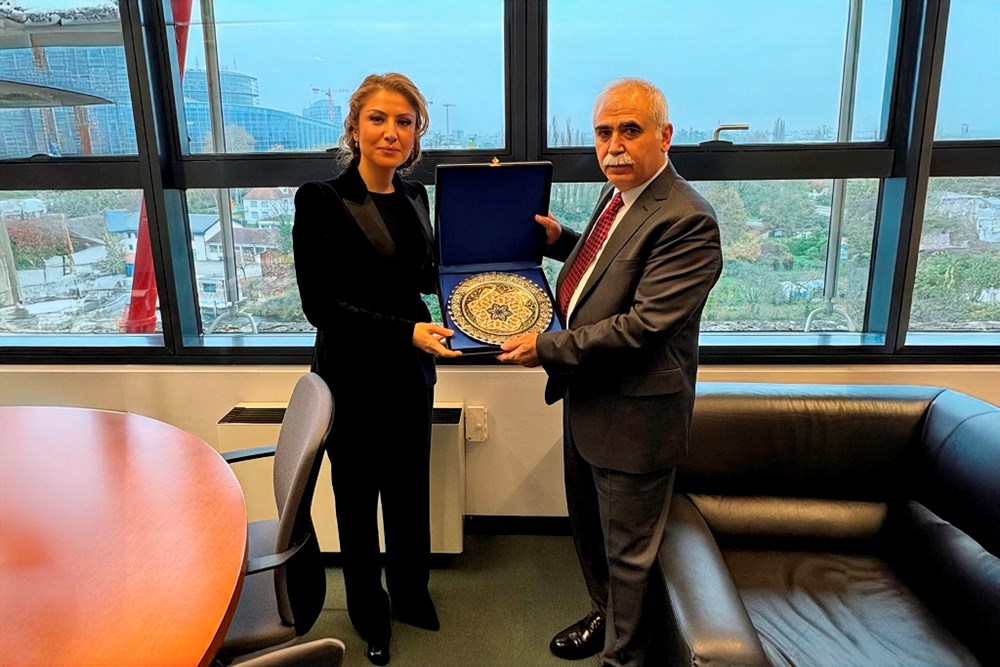The president of Turkey’s Constitutional Court attributed the country’s failure to implement judgments of the European Court of Human Rights (ECtHR) to its refugee crisis and fight against terrorism during a visit to the Strasbourg court last week, the TR724 news website reported on Friday.
Leading a delegation from the top court, Chief Justice Kadir Özkaya met with ECtHR officials as part of a broader series of discussions with France’s Constitutional Council, Council of State and the ECtHR from November 6 to 9.
Özkaya and his delegation met with ECtHR officials in Strasbourg on November 8.
A statement released on the website of the Constitutional Court quoted Özkaya as telling ECtHR officials that Turkey’s Constitutional Court closely follows the rulings and jurisprudence of the ECtHR, claiming that the two courts’ jurisprudence aligns in all but “a very small number of cases.”
Özkaya cited Turkey’s refugee crisis and fight against terrorism as reasons for diverging from the jurisprudence of the Strasbourg Court.
“Turkey hosts approximately 4.5 million refugees, a number exceeding the population of many European countries. Additionally, Turkey continues its fight against terrorist organizations such as FETÖ and the [outlawed Kurdistan Workers’ Party] PKK. I must emphasize that Turkey operates within constitutional boundaries and with a focus on human rights, making every effort in this regard,” Özkaya said.
FETÖ is an abbreviation coined by the Turkish government to refer to the faith-based Gülen movement, inspired by the late Turkish cleric Fethullah Gülen, as a terrorist organization.
The PKK has waged a war against the Turkish state since 1984. Tens of thousands of people have been killed in the conflict so far. It has been designated as a terrorist group by Turkey and its Western allies.
The November 8 meeting included opening remarks by Özkaya and ECtHR President Marko Bošnjak, followed by two sessions featuring presentations on the application of the European Convention on Human Rights by national courts and the challenges posed by a high volume of applications along with potential solutions.
In June, Stefan Schennach, one of the co-rapporteurs of the Parliamentary Assembly of the Council of Europe for the monitoring of Turkey’s obligations and commitments, once again called on Turkish authorities to implement the judgments of the court following a fact-finding visit to the country.
Recalling that he had strongly called on Turkish authorities to take without delay all necessary measures to implement the judgments concerning jailed businessman and philanthropist Osman Kavala and imprisoned Kurdish leader Selahattin Demirtaş, Schennach added that the resolution of these cases “lies in the hands of the Turkish judiciary, which has the capacity to find a legal solution in compliance with the requirements of the Committee of Ministers.”
Demirtaş, a two-time presidential candidate and former co-chair of the pro-Kurdish Peoples’ Democratic Party (HDP), has been imprisoned since 2016.
In its 2020 ruling on Demirtaş, the ECtHR said his “unjustified” detention pursued the ulterior motive of stifling pluralism and limiting freedom of political debate in Turkey.
Kavala, 67, who has been in prison since November 2017, received a life sentence in 2022 for allegedly trying to topple President Recep Tayyip Erdoğan’s government with the Gezi Park protests, which erupted in the summer of 2013 against government plans to destroy a park in central İstanbul.
The ECtHR said in another ruling in 2020 that Kavala’s “unjustified and extended” detention had the ultimate purpose of reducing him to silence.
The Council of Europe’s Committee of Ministers launched an infringement proceeding against Turkey over its treatment of Kavala on February 2, 2022. This could potentially see Ankara expelled from the continent’s leading human rights organization.
Turkey’s continued detention of Kavala and Demirtaş, despite ECtHR orders for their release, was also criticized last month in the European Commission’s yearly report on Turkey, which is part of the European Union’s annual assessment of Turkey’s progress and setbacks as a candidate country for EU membership.
The EU called on Turkey to align its legal standards with European norms, specifically in ensuring fair trials, suspects’ rights and the presumption of innocence, reiterating that until significant reforms are undertaken, Turkey’s EU accession talks will remain at a standstill.
According to statistics from the ECtHR, approximately 23,400 applications from Turkey are pending before the court, making it the highest case-count country in 2023. Turkey remained the highest case-count country last year, after replacing Russia in 2022.
